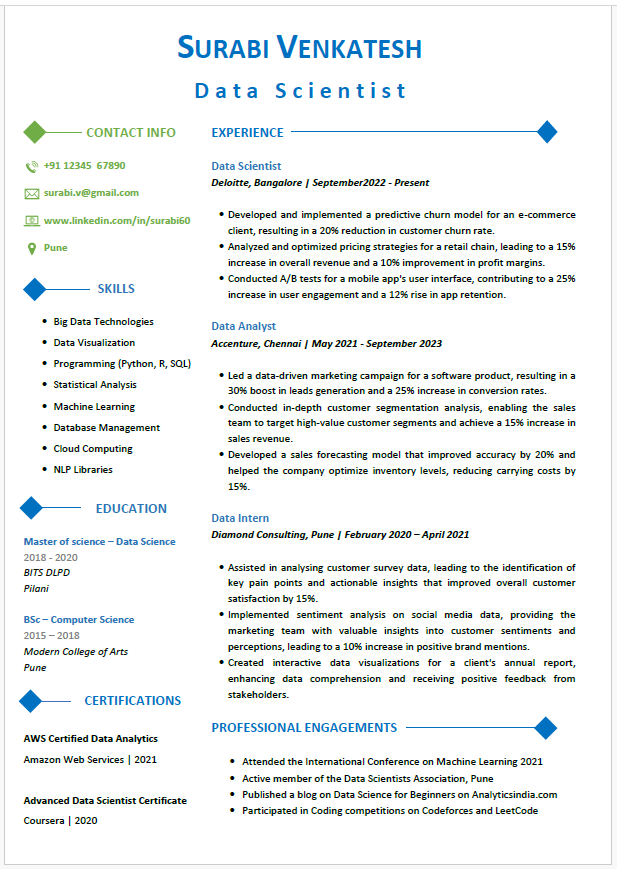Data Scientist
Master of science – Data Science

About this template
This is a very simple and professional resume which can effectively highlight your skills and experiences in a clear and concise manner.
This template is made in MS Word so, users can easily customize it to fit their specific needs.
Some most common and important technical skills for Data Scientist
Here are some of the most common and important technical skills for a Data Scientist, each explained briefly:
1. Statistical Analysis:
Statistical analysis is fundamental to understanding data patterns and trends. Proficiency in statistical methods, such as regression analysis, hypothesis testing, and probability, allows Data Scientists to make data-driven decisions and predictions.
2. Programming Languages:
Data Scientists must be proficient in programming languages like Python and R. These languages are essential for data manipulation, analysis, and creating machine learning models, with libraries like Pandas, NumPy, and Scikit-learn being commonly used.
3. Machine Learning:
Machine learning is crucial for building predictive models. Skills in supervised and unsupervised learning algorithms, such as decision trees, random forests, and clustering, enable Data Scientists to create models that can predict outcomes and identify patterns in data.
4. Data Wrangling and Cleaning:
Data wrangling involves cleaning and transforming raw data into a usable format. This skill is essential for handling messy or incomplete data, ensuring that it is ready for analysis. Proficiency in tools like Pandas and SQL is often required.
5. Data Visualization:
Effective data visualization is key to communicating insights. Data Scientists use tools like Matplotlib, Seaborn, and Tableau to create clear, informative visualizations that help stakeholders understand complex data trends and patterns.
6. Big Data Technologies:
Handling large datasets requires familiarity with big data technologies like Hadoop, Spark, and Hive. These tools enable Data Scientists to process and analyze vast amounts of data efficiently, making them essential for working with large-scale data.
7. Database Management:
Knowledge of SQL and NoSQL databases is crucial for managing and querying large datasets. Data Scientists need to be able to efficiently retrieve and manipulate data from databases to perform their analyses.
8. Data Mining:
Data mining involves discovering patterns and relationships in large datasets. Skills in techniques like clustering, classification, and association rule learning are important for extracting valuable insights from data.
9. Deep Learning:
Deep learning is a subset of machine learning that focuses on neural networks with many layers. Proficiency in frameworks like TensorFlow and PyTorch allows Data Scientists to build complex models for tasks such as image recognition and natural language processing.
10. Domain Knowledge:
Understanding the specific domain or industry in which they work is crucial for Data Scientists. This knowledge helps in contextualizing data, defining relevant questions, and applying appropriate models, making the analysis more impactful and relevant to business goals.
Conclusion:
These technical skills form the foundation for a successful career in data science, enabling professionals to extract insights from data, build predictive models, and communicate their findings effectively.